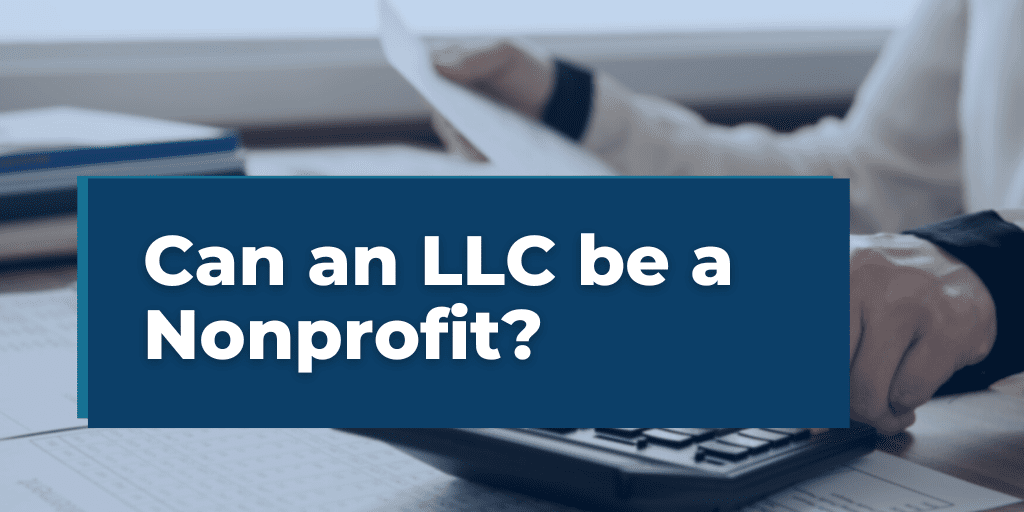Can an LLC be structured as a nonprofit? Yes, it can. However, it’s not easy and requires precise legal and financial regulation. An LLC, commonly linked with for-profit enterprises for its flexibility and limited liability, can adapt to serve nonprofit purposes. This requires strict compliance with state and federal regulations, including a clear declaration of a nonprofit mission in its operating agreement and adherence to tax-exempt organization rules. This blog post delves into the intricacies of unifying the LLC structure with nonprofit goals and the proper way to go about about doing so.
Understanding LLCs (Limited Liability Companies)
What is an LLC?
A Limited Liability Company (LLC) is a versatile business structure that combines elements of both corporations and partnerships. Its most notable feature is the limited liability protection it offers to its owners, known as members. This means that members are typically not personally responsible for the company’s debts and liabilities, much like shareholders in a corporation.
Structure and Purpose
LLCs are favored for their flexibility in management and operation. Unlike corporations, which must adhere to rigid procedures and structures, LLCs offer a more relaxed and adaptable framework. This flexibility extends to taxation as well; an LLC can choose to be taxed as a sole proprietorship, partnership, or corporation, depending on what best suits its business model.
Key Benefits of an LLC
- Limited Liability: Members are protected from personal liability for business decisions or actions of the LLC. This protection is vital in case the business incurs debt or faces lawsuits.
- Tax Flexibility: LLCs enjoy a “pass-through” tax status by default, meaning the business itself isn’t taxed directly. Instead, profits and losses pass through to members’ personal tax returns.
- Management Versatility: There are fewer restrictions on how an LLC can be managed. Members can opt for a management structure that suits their business.
Drawbacks of an LLC
- Limited Life: In some states, an LLC is required to dissolve upon the death or withdrawal of a member, although this can often be overridden in the LLC agreement.
- Self-Employment Taxes: Members of an LLC might be subject to self-employment taxes, as profits are considered earned income.
- Varied State Laws: Regulations and fees for LLCs can vary significantly from state to state, requiring careful consideration when setting up.
In the next section, we will explore how these characteristics of LLCs compare and contrast with nonprofit organizations, setting the stage to answer the central question: Can an LLC operate as a nonprofit?
Overview of Nonprofit Organizations
Definition and Characteristics
Nonprofit organizations are entities dedicated to furthering a social cause or advocating for a shared point of view. Unlike for-profit businesses, they do not distribute profits to owners or shareholders. Instead, any surplus revenues are reinvested into the organization to advance its mission. These entities are characterized by their focus on objectives such as public service, education, charity, or religion.
Types of Nonprofit Organizations
Nonprofits can vary widely in their focus and structure. Some common types include:
- Charitable Organizations: Typically what people think of when they hear “nonprofit,” these focus on philanthropic goals like relief of the poor, advancement of education or religion, etc.
- Social Advocacy Groups: These organizations aim to influence public policy or societal issues.
- Trade and Professional Organizations: These cater to the interests and development of a specific profession or trade.
- Social and Recreational Clubs: Focused on personal recreation, social activities, and hobbies.
Tax-Exempt Status
A key aspect of nonprofit organizations is their eligibility for tax-exempt status, particularly under IRS code 501(c)(3), which applies to entities organized and operated exclusively for religious, charitable, scientific, or educational purposes. This status exempts them from federal income tax and allows donors to make tax-deductible contributions.
Governance and Regulations
Nonprofits are typically governed by a board of directors or trustees. The governance structure is often dictated by both state law and the organization’s own bylaws. They are subject to strict regulations in terms of transparency, accountability, and the use of funds, ensuring that activities align with their declared nonprofit mission.
With this understanding of nonprofit organizations, we can begin to explore the intriguing possibility of an LLC operating within this framework. The following section will delve into the legal feasibility and practicality of an LLC functioning as a nonprofit.
Can an LLC be a Nonprofit?
Legal Feasibility
At its core, the question of whether an LLC can be a nonprofit hinges on legal and regulatory frameworks. Traditionally, nonprofits have been organized as corporations, not LLCs, primarily because of the clear legal provisions for nonprofit corporations. However, there is no explicit legal barrier that prevents an LLC from being a nonprofit. The Internal Revenue Service (IRS) allows LLCs to apply for tax-exempt status, provided all members are 501(c)(3) organizations or governmental entities.
IRS Regulations and State Laws
The IRS’s stance on LLCs seeking nonprofit status has evolved. In 2012, the IRS started granting 501(c)(3) status to LLCs under certain conditions:
- Specific Clauses in Articles of Organization: The LLC’s Articles of Organization must include clauses stating that its activities will be limited to one or more exempt purposes, and that upon dissolution, its assets will be distributed for an exempt purpose.
- All Members Must be 501(c)(3) Entities: If the LLC has more than one member, each must be a recognized 501(c)(3) organization or a governmental entity.
State laws also play a crucial role. Some states have specific statutes regarding nonprofit LLCs, while others may not explicitly recognize the concept. It’s important for LLCs to comply with both state law and IRS regulations to maintain their tax-exempt status.
Case Studies and Examples
There are examples of LLCs that have successfully navigated the process to become nonprofit, tax-exempt organizations. These cases often involve entities that require a flexible management structure provided by an LLC, along with the desire to have a social impact. Such examples can provide valuable insights into the practical aspects of structuring and operating a nonprofit LLC.
Practical Considerations and Implications
While it is legally possible for an LLC to be a nonprofit, the path is complex and requires careful adherence to both IRS requirements and state laws. The decision to use an LLC structure for a nonprofit should be based on specific organizational needs and a thorough understanding of the legal implications.
In the next section, we will explore the advantages and challenges of structuring a nonprofit as an LLC, to better understand why and how organizations might choose this path.
Advantages and Challenges of a Nonprofit LLC
Advantages of a Nonprofit LLC
- Flexibility in Management: LLCs offer a more flexible management structure compared to traditional nonprofit corporations. This flexibility can be advantageous for small organizations or those with unique operational needs.
- Limited Liability Protection: Like for-profit LLCs, nonprofit LLCs provide limited liability protection to their members, which can be crucial for organizations engaged in activities with potential legal risks.
- Operational Freedom: LLCs are not bound by the same formalities as corporations, such as holding regular board meetings or maintaining detailed minutes, allowing for more streamlined operations.
Challenges in Forming and Operating a Nonprofit LLC
- Navigating Tax-Exempt Status: Obtaining and maintaining 501(c)(3) status as an LLC can be more complex than for a traditional nonprofit corporation. Strict compliance with IRS conditions is mandatory.
- State Law Variations: Since LLC laws vary significantly by state, understanding and adhering to specific state regulations is a critical and potentially challenging aspect.
- Public Perception and Fundraising: There might be a lack of understanding or trust from the public and potential donors due to the less common use of LLCs in the nonprofit sector. This can impact fundraising efforts.
- Administrative Burden: Despite operational flexibility, the unique nature of a nonprofit LLC may require additional legal and accounting expertise to navigate the intersection of LLC and nonprofit regulations.
Key Considerations
Organizations considering the nonprofit LLC model must weigh these advantages against the challenges. The choice should align with their specific mission, operational needs, and capacity to manage the legal complexities involved.
Steps to Establish a Nonprofit LLC
For those who choose to pursue the path of a nonprofit LLC, understanding the establishment process is crucial.
Step-By-Step Guide
- Research and Planning
- Understand State Laws: Since LLC laws vary by state, begin by researching the specific requirements in your state.
- Define Your Mission: Clearly articulate the mission and purpose of your nonprofit LLC. This will be critical for both legal formation and IRS exemption applications.
- Choose a Name
- Naming Conventions: Select a name that complies with state LLC requirements and reflects your nonprofit mission.
- Check Availability: Ensure the name isn’t already in use or too similar to existing entities.
- File Articles of Organization
- Preparation: Draft and file the Articles of Organization with your state’s LLC filing office. This document should include specific language about your nonprofit purpose and the distribution of assets upon dissolution, in line with IRS requirements for tax-exempt status.
- Filing Fee: Pay the required filing fee, which varies by state.
- Create an Operating Agreement
- Drafting the Agreement: Although not required in all states, an operating agreement is crucial for outlining the management and operational structure of your LLC. Include provisions that ensure adherence to nonprofit standards and practices.
- Obtain an Employer Identification Number (EIN)
- Application: Apply for an EIN from the IRS. This is necessary for tax purposes, even if you don’t have employees.
- Apply for Tax-Exempt Status
- IRS Form 1023 or 1023-EZ: Submit the appropriate form to the IRS to apply for 501(c)(3) status. This step is critical and requires detailed information about your organization’s purpose, activities, and governance structure.
- State Tax Exemptions: Additionally, apply for any relevant state tax exemptions.
- Comply with State Reporting and Registration Requirements
- Annual Reports: Most states require annual or periodic reports to maintain good standing.
- Charitable Solicitation Registration: If you plan to solicit donations, register with the state’s charitable solicitation authority.
- Set up Financial Systems
- Bank Account: Open a bank account in the name of the LLC.
- Accounting Systems: Establish accounting systems that comply with nonprofit accounting standards, including tracking of revenues and expenses.
- Implement Governance and Compliance Mechanisms
- Board of Directors: Establish a board of directors to oversee the organization, if not already done.
- Bylaws and Policies: Develop bylaws and policies that guide operations, ensuring they align with nonprofit governance best practices.
- Ongoing Compliance
- Maintain Records: Keep detailed records of meetings, financial transactions, and compliance efforts.
- IRS Filings: Submit annual returns to the IRS (Form 990 series) and maintain transparency in operations.
Best Practices and Considerations for Managing a Nonprofit LLC
Successfully managing a nonprofit LLC requires adherence to best practices and key considerations that ensure legal compliance and operational effectiveness:
- Stay Informed on Legal Changes: Keep abreast of changes in state laws and IRS regulations related to nonprofit LLCs.
- Maintain Clear Separation of Funds: Avoid commingling personal and business funds to uphold the integrity of the nonprofit status.
- Ensure Transparency: Regularly disclose financial and operational information to maintain public trust and comply with nonprofit reporting requirements.
- Engage in Ethical Fundraising: Adhere to ethical standards in fundraising activities, ensuring that all funds are used in alignment with the organization’s mission.
- Invest in Good Governance: Establish strong governance practices, including a committed board of directors and clear operational policies.
- Seek Professional Advice: Regularly consult with legal and financial experts to navigate the complexities of operating a nonprofit LLC.
By following these practices, a nonprofit LLC can operate effectively and maintain its commitment to its mission and legal obligations.
FAQs: Can an LLC Be a Nonprofit?
1. Can an LLC legally operate as a nonprofit?
Yes, an LLC can be structured as a nonprofit, but it must meet IRS requirements, such as having a charitable purpose and ensuring no profits benefit private individuals.
2. What’s the difference between a nonprofit LLC and a 501(c)(3) organization?
A nonprofit LLC is a legal business structure, while 501(c)(3) status is a tax-exempt designation from the IRS. An LLC must apply for 501(c)(3) status separately to gain tax exemptions.
3. How do you form a nonprofit LLC?
To form a nonprofit LLC, you must establish a charitable purpose, create an operating agreement that follows nonprofit guidelines, register with your state, and apply for 501(c)(3) status with the IRS.
4. Can a nonprofit LLC have owners?
No, a nonprofit LLC cannot have traditional owners or shareholders. Instead, it must be controlled by members or a board of directors dedicated to its mission.
5. What are the benefits of a nonprofit LLC?
A nonprofit LLC provides liability protection, flexibility in management, and potential tax exemptions if it qualifies for 501(c)(3) status.
6. Are donations to a nonprofit LLC tax-deductible?
Donations are only tax-deductible if the nonprofit LLC has obtained 501(c)(3) tax-exempt status from the IRS.
7. Can a for-profit LLC convert to a nonprofit?
Yes, but the process involves restructuring, amending organizational documents, and applying for 501(c)(3) status. State laws and IRS regulations must be followed.
8. Does a nonprofit LLC pay taxes?
If the nonprofit LLC obtains 501(c)(3) status, it is generally exempt from federal income tax. However, it may still be responsible for certain state and local taxes.
9. What restrictions does a nonprofit LLC face?
A nonprofit LLC must use its revenue for its mission, cannot distribute profits to members, and must follow strict compliance and reporting rules set by the IRS.
10. Where can I learn more about forming a nonprofit LLC?
You can check the IRS website, consult a nonprofit attorney, or work with a CPA specializing in nonprofit organizations to ensure compliance.
Conclusion
In summary, while an LLC can indeed be structured as a nonprofit, this choice requires careful navigation of complex legal and regulatory landscapes. The flexibility and limited liability of an LLC need to be balanced with the stringent requirements of maintaining a nonprofit status. For organizations considering this path, it’s essential to align their decision with their mission and operational needs.
If you’re contemplating forming a nonprofit LLC or navigating the complexities of nonprofit financial management, seeking expert guidance is crucial. At Velu, we specialize in nonprofit CPA services, offering the expertise and support needed to ensure your organization’s financial health and compliance. Contact us at Velu for tailored advice and solutions that align with your nonprofit’s unique goals and challenges.





